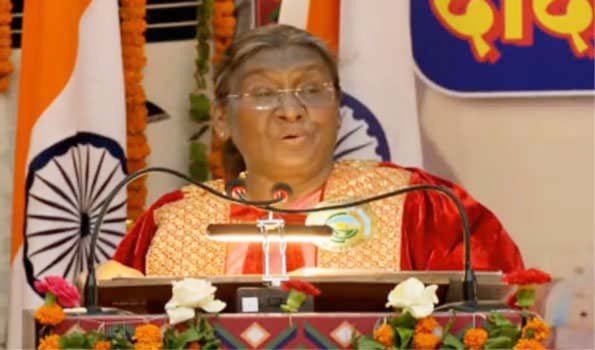Dharamshala, May 6 (UNI) Emphasising that the nation’s progress depends on the continuous development of education and research in science and technology, President Draupadi Murmu on Monday called for tailoring India’s research programmes as per national contemplation and need rather than blindly aping other countries.
“We need to set our priorities and programmes in education and research on the basis of national contemplation and need, rather than blindly imitating the methods set by other countries. Development in the field of science must be sustained by our cultural heritage and internal resource base”, Murmu said.
The President was addressing the seventh convocation of Himachal Pradesh Central University here.
Altogether 709 under-graduate and post-graduate students were allotted various degrees. Thirty students who stood first in various faculties were honored with gold medals. Eleven researchers were awarded PhD degrees by the President.
She said the Himachal Pradesh Central University, Dharamshala, is leading in this direction and extended her best wishes to the students and researchers of various disciplines and programmes who received medals or degrees at the convocation.
Murmu said talented researchers, young subject experts, scientists and thinkers will play a meaningful role in the development of the nation.
The President said the world is becoming a global village and at such a time there is a great need to adopt and encourage a concrete policy which promotes educational cooperation and student-teacher mobility at the international level.
Murmu said there were two forms of internationalisation in the field of education – traditional and modern. The traditional form emphasises on academic values. The modern form primarily focuses on education in the context of export/import and economic gains in the international business framework. The traditional form’s strategy stresses on the mobility of students and to some extent teachers.
The modern form, on the other hand, creates business models that include institutional mobility and programme mobility along with the mobility of students and teachers with the primary objective of economic interests.
“We will continue to need to focus primarily on the traditional model for the quality of teaching, research and intellectual environment in universities, which will enable better knowledge creation and dissemination,” she said.
She said that it would be better if the process of scientific thinking and creative thinking starts very early in the life of a student, at the school level. “We need to overcome the lack of academic efforts and infrastructure related to science teaching at the school level, which has been brought under the National Education Policy,” the president said.
She said a Knowledge-driven economy can create and disseminate knowledge, which is used to strengthen economic development and living standards. She stressed on the need to understand the characteristics and working process of the knowledge-driven economy and implement such a strategy for economic development in India in which knowledge management plays a primary role.
“Keeping in mind ambitious programmes like ‘Start-up’ and ‘Make in India’, I would like to say that the higher education institutions of the country should inspire and encourage entrepreneurship and innovation.
“Higher education institutions should not only disseminate information but also create knowledge and connect it with the needs of the local communities,” she said.
She expressed happiness at Himachal Pradesh Central University offering a course called ‘Community Lab’ under which students and teachers of the university connect with the surrounding communities. This is not only making the university reach out to the communities, but also making the students aware of the realities of rural India, the President said.
She also hoped that the university would soon have its permanent campus equipped with the best facilities and work environment.











